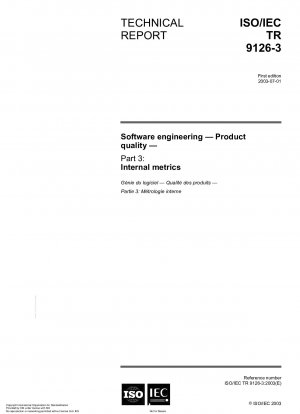ISO/IEC TR 9126-3:2003
Software engineering - Product quality - Part 3: Internal metrics
- Standard No.
- ISO/IEC TR 9126-3:2003
- Release Date
- 2003
- Published By
- International Organization for Standardization (ISO)
- Latest
- ISO/IEC TR 9126-3:2003
- Scope
- This Technical Report defines internal metrics for quantitatively measuring external software quality in terms of characteristics and subcharacteristics defined in ISO/IEC 9126-1, and is intended to be used together with ISO/I EC 9126-1. This Technical Report contains: I. an explanation of how to apply software quality metrics II. a basic set of metrics for each subcharacteristic III. an example of how to apply metrics during the software product life cycle This Technical Report does not assign ranges of values of these metrics to rated levels or to grades of compliance, because these values are defined for each software product or a part of the software product, by its nature, depending on such factors as category of the software, integrity level and users' needs. Some attributes may have a desirable range of values, which does not depend on specific user needs but depends on generic factors; for example, human cognitive factors. This Technical Report can be applied to any kind of software for any application. Users of this Technical Report can select or modify and apply metrics and measures from this Technical Report or may define application-specific metrics for their individual application domain. For example, the specific measurement of quality characteristics such as safety or security may be found in International Standards or Technical Reports provided by IEC 65 and ISO/IEC JTC 1/SC 27. Intended users of this Technical Report include: — Acquirer (an individual or organization that acquires or procures a system, software product or software service from a supplier); — Evaluator (an individual or organization that performs an evaluation. An evaluator may, for example, be a testing laboratory, the quality department of a software development organization, a government organization or a user); — Developer (an individual or organization that performs development activities, including requirements analysis, design, and testing through acceptance during the software life cycle process); — Maintainer (an individual or organization that performs maintenance activities); — Supplier (an individual or organization that enters into a contract with the acquirer for the supply of a system, software product or software service under the terms of the contract) when validating software quality at qualification test; — User (an individual or organization that uses the software product to perform a specific function) when evaluating quality of software product at acceptance test; — Quality manager (an individual or organization that performs a systematic examination of the software product or software services) when evaluating software quality as part of quality assurance and quality control.
ISO/IEC TR 9126-3:2003 Referenced Document
- GB/T 16260.1-2006 Software engineering - Product quality - Part 1: Quality model*, 2006-03-14 Update
- GB/T 16260.2-2006 Software engineering - Product quality - Part 2: External metrics*, 2006-03-14 Update
- GB/T 16260.4-2006 Software engineering - Product quality - Part 4: Quality in use metrics*, 2006-03-14 Update
- GB/T 5271.20-1994 Information technology--Vocabulary--Part 20:System development
- GB/T 8566-2001 Information technology--Software life cycle processes
ISO/IEC TR 9126-3:2003 history
- 2003 ISO/IEC TR 9126-3:2003 Software engineering - Product quality - Part 3: Internal metrics
